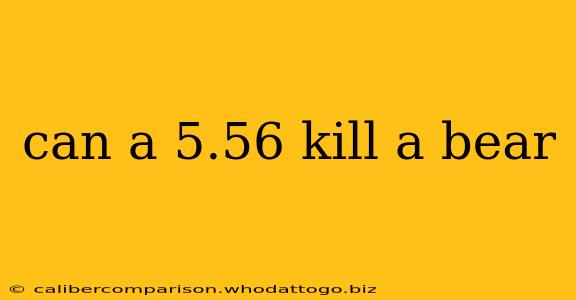The question of whether a 5.56x45mm NATO round (.223 Remington) can kill a bear is complex and doesn't have a simple yes or no answer. While it's possible, it's far from ideal and relies heavily on several critical factors. This article will delve into the details, exploring the limitations of the 5.56 and offering crucial advice for bear safety.
Understanding the Limitations of the 5.56 Cartridge
The 5.56 cartridge, while effective against human targets and smaller animals, possesses inherent limitations when facing a large, powerful predator like a bear. Its primary design focuses on incapacitation through rapid, multiple shot impact rather than delivering massive stopping power with a single round. Key limitations include:
-
Lower Energy Transfer: Compared to larger calibers like .308 Winchester or .375 H&H Magnum, the 5.56 round delivers significantly less kinetic energy upon impact. This means it may not have the power to instantly incapacitate a bear, especially with a less-than-perfect shot.
-
Limited Penetration: The 5.56's relatively small diameter and bullet construction may struggle to penetrate a bear's thick hide and dense muscle mass, especially at longer ranges. This reduces its effectiveness in delivering vital organ damage.
-
Reliance on Shot Placement: To be effective against a bear, the 5.56 requires extremely precise shot placement – hitting vital organs like the brain or heart. Even then, multiple shots may be necessary.
Factors Influencing the Outcome
The effectiveness of a 5.56 against a bear isn't solely determined by the cartridge itself. Other critical factors come into play:
-
Bear Species and Size: A smaller black bear will be more susceptible to a 5.56 than a massive grizzly or Kodiak bear. The bear's size directly impacts the effectiveness of the round.
-
Shot Placement: As previously mentioned, precise shot placement is paramount. A shot to the shoulder or leg might only anger the bear, while a well-placed shot to the brain or heart offers the best chance of immediate incapacitation.
-
Ammunition Type: The type of ammunition used significantly influences the round's performance. Certain types of 5.56 ammunition, like those designed for increased penetration or stopping power, will perform better than standard FMJ rounds.
-
Range: At longer ranges, the 5.56 round loses velocity and energy, reducing its effectiveness. Close-range encounters offer the best chance of success.
Safer Alternatives for Bear Defense
While a 5.56 might be usable in a dire emergency, it's crucial to understand that it's not the optimal choice for bear defense. Larger calibers designed for big game hunting, such as:
- .308 Winchester
- .375 H&H Magnum
- 12 gauge shotgun (with appropriate slugs)
Offer a far greater margin of safety and are much more likely to incapacitate a bear quickly.
Bear Safety: Prevention is Key
The best approach to bear encounters is to avoid them altogether. Practice proper bear safety measures, including:
- Carrying bear spray: This is far more effective than any firearm in deterring a bear attack.
- Making noise while hiking: This helps to avoid surprising a bear.
- Storing food properly: Never leave food unattended.
- Being aware of your surroundings: Pay attention to signs of bear activity.
Conclusion
Can a 5.56 kill a bear? Yes, potentially, under ideal circumstances. However, it's a risky proposition. The 5.56's limitations make it a less-than-ideal choice for bear defense. Prioritize prevention, carry bear spray, and consider a larger caliber firearm if you anticipate bear encounters for significantly increased safety and a higher chance of survival. This article is for informational purposes only and should not be construed as professional advice. Always consult with experts regarding firearm safety and bear defense techniques in your specific region.

